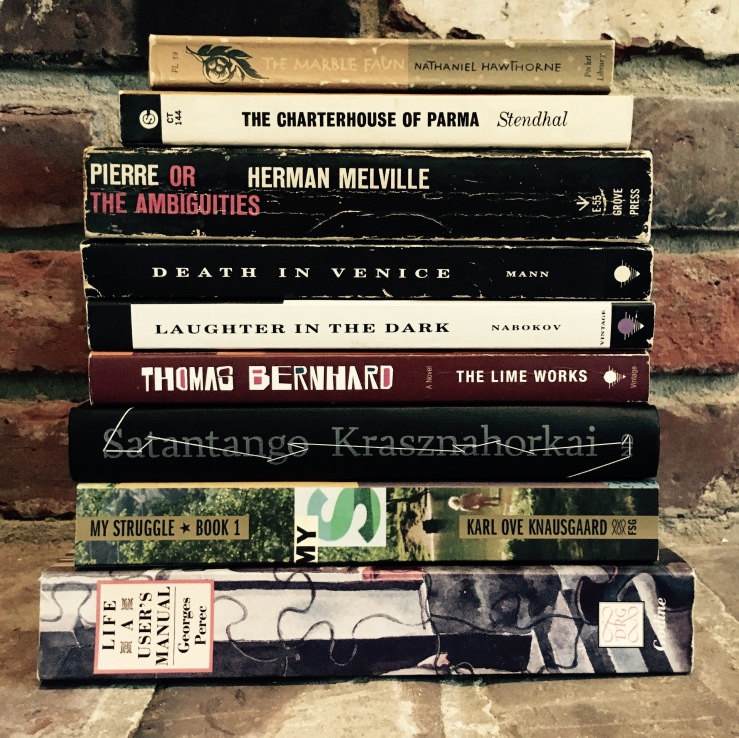I read a lot of great books over the past few months and failed to write proper reviews for some of them, including two by Stanley Elkin—The Franchiser and The Dick Gibson Show—a double feature of two novellas by W.D. Clarke called White Mythology, and Marketa Lazarova by Vladislav Vančura. But I did riff on other books.
One of the best books I’ve read in ages is Brazilian writer João Gilberto Noll’s 1991 novella Quiet Creature on the Corner (new in English translation (by Adam Morris) from Two Lines Press). I reviewed the book, but also noted—
The book is probably best read without any kind of foregrounding or forewarning.
Forewarning (and enthusiastic endorsement): Quiet Creature on the Corner is a nightmarish, abject, kinetic, surreal, picaresque read, a mysterious prose-poem that resists allegorical interpretation. I read it and then I read it again. It’s a puzzle. I enjoyed it tremendously.

Frequent answers (both on the blog, on Twitter, and via email) included lots of “big” books, especially Gravity’s Rainbow, War and Peace, Moby-Dick, and Infinite Jest. I was also surprised at how many readers cited Dostoevksy’s novel The Idiot, a book I’ve started at least four times without success.
Readers also told me that I needed to stick it out with The Charterhouse of Parma, which I did. I wrote about French Stendhal’s “Italian” novel here and here. Short version: Parts were great but the novel was often exhausting—Charterhouse is a novel about boredom that is frequently boring. But the fault is mine.
Another French novel I got bored with was Hell, Henri Barbusse’s 1908 novel of voyeurism (I read (and often just skimmed, to be honest) 1966 English translation by Robert Baldick. (As an aside, I think my boredom and comprehension of the novel made it easy to write about—whereas I sometimes have difficulty writing about a novel that I find perplexing and which I feel a passion for, like Vančura’s Marketa Lazarova).
I was very passionate about an Italian “Italian” novel (or set of novels, I suppose), Elena Ferrante’s so-called Neapolitan Novels. I wrote about Ferrante’s powers of abjection, stating—
From the earliest pages of the first novel, My Brilliant Friend, Ferrante crafts a world—a brutal neighborhood in Naples—which seems real, full, squirming with dirty bloody life. The novel also reminded me of 2666, although I couldn’t figure out why at first (my friend had not suggested a connection). A simple answer is that both novels are propulsive, addictive, impossibly rich, and evocative of specific and real worlds, real worlds anchored in dreams and nightmares.
But it’s also the horror. Ferrante, like Bolaño, captures the horrific violence under the veneer of civilization. While My Brilliant Friend and its three “sequels” (they are one novel, to be sure) undertake to show the joys and triumphs and sadnesses of a life (and more than one life), they also reverberate with the sinister specter of abjection—the abjection of violence, of history, and of the body itself. The novels are messy, bloody, and tangled, their plot trajectories belying conventional expectations (in the same way that the novels’ awful covers belie their internal excellence—kitschy romantic smears glossing over tumult).
I’m glad I finished the quartet.
As a sort of sequel or answer or rejoinder or whatever to my question posing post about books I’ve attempted the most without ever finishing, I wrote about the novels I’m always dipping into without ever hoping to really finish.

I also recycled two older posts: A thing I wrote about The BFG as a love letter Dahl wrote to his deceased daughter (recycled for the Spielberg film) and a review of Hemingway’s overlooked novel of doomed polyamory, The Garden of Eden (recycled for the man’s birthday).
I also spent a fun Friday afternoon browsing old sci-fi covers.
Also: Derek Pyle, of Waywords and Meansigns, interviewed novelist Brian Hall about a bunch of stuff, including his work adapting Finnegans Wake, a novel on my “I probably will never really read this all the way through, but…” list.
Promised pig: Jamie Wyeth’s Winter Pig, 1975–


Did you ever come up for air ?
LikeLike
Hahahaha…not sure…
LikeLiked by 1 person